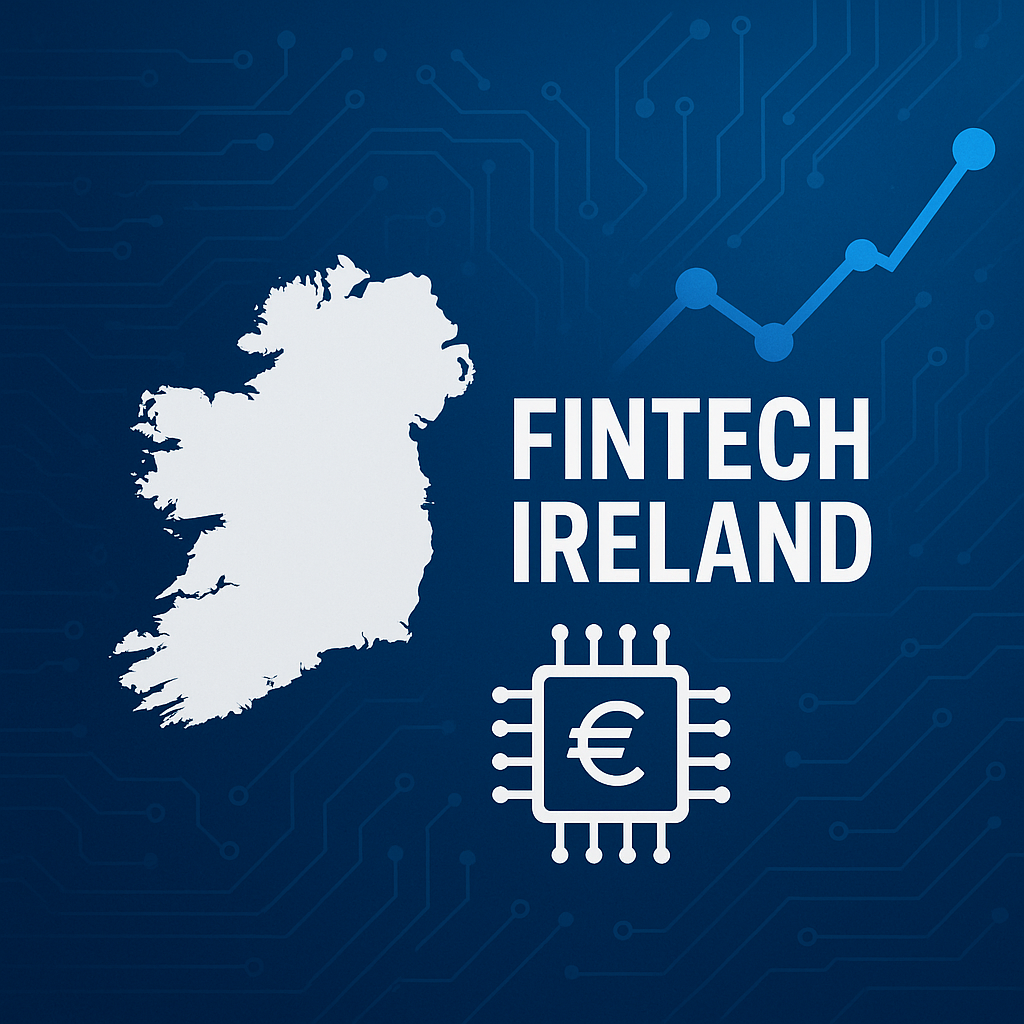
Ireland, often lauded as the “Silicon Valley of Europe,” has quietly but powerfully cultivated a thriving fintech ecosystem.
From its historical roots to its cutting-edge innovations, the Emerald Isle has become a significant player on the global fintech stage. If you’re intrigued by the intersection of finance and technology, looking for fintech ireland jobs, seeking the pulse of fintech ireland office locations, or simply curious about this dynamic sector, you’ve landed in the right place.
This comprehensive guide will navigate the fascinating world of fintech ireland, exploring its past, present, and promising future. We’ll delve into the key players, address your burning questions, and illuminate why Ireland stands out as a global fintech hub. Get ready to unlock the secrets of Ireland’s financial technology revolution!
What is Fintech Ireland?
Fintech Ireland refers to the community, companies, and overall ecosystem dedicated to financial technology innovation within Ireland. It encompasses a wide range of businesses, from early-stage startups to established multinational corporations, all leveraging technology to improve, automate, and streamline financial services. Think of it as the dynamic intersection where Ireland’s strong financial heritage meets its burgeoning tech prowess.
What is Fintech?
At its core, fintech (financial technology) describes the use of technology to make financial services more efficient, accessible, and user-friendly. This can involve developing new software, applications, processes, or business models that disrupt traditional financial practices. From mobile banking apps and digital payment platforms to sophisticated algorithmic trading systems and blockchain technologies, fintech is reshaping how we manage, access, and interact with our finances.
A Glimpse into the History of Fintech in Ireland
Ireland’s journey into fintech isn’t an overnight success story. It’s a narrative woven from decades of strategic development and a confluence of favorable factors:
- A Strong Financial Services Heritage: Ireland has long been a prominent center for financial services, attracting major international banks, insurance companies, and asset managers. This established infrastructure and pool of talent provided a fertile ground for fintech innovation.
- Government Support and Pro-Business Environment: The Irish government has actively fostered a business-friendly environment, offering attractive tax incentives, research grants, and support programs for startups and established companies alike. This commitment has been crucial in attracting foreign direct investment and nurturing local innovation in the fintech sector. Organizations like Enterprise Ireland play a vital role in supporting the growth of Irish fintech companies.
- A Highly Educated and Tech-Savvy Workforce: Ireland boasts a young, educated, and multilingual workforce, with a strong emphasis on science, technology, engineering, and mathematics (STEM) fields. This talent pool is essential for the growth and innovation within the fintech companies operating in Ireland.
- Strategic Location and Access to the EU Market: As an English-speaking member of the European Union, Ireland offers fintech companies seamless access to the vast EU market and a bridge between Europe and the United States. This strategic positioning has made it an attractive base for international expansion.
- Early Adoption of Technology: Ireland has historically been an early adopter of new technologies, creating a receptive environment for the development and implementation of fintech solutions.
Over the years, this combination of factors has led to the organic growth of a vibrant fintech ireland ecosystem, attracting significant investment and fostering the emergence of innovative startups and the expansion of global fintech players within the country.
Is Fintech a Good Career in Ireland?
Absolutely! A career in fintech ireland offers a wealth of opportunities and significant advantages:
- High Demand: The fintech sector in Ireland is experiencing rapid growth, leading to a strong demand for skilled professionals across various domains, from software development and data science to compliance and business development. The abundance of fintech ireland jobs reflects this thriving market.
- Competitive Salaries: Due to the specialized skills required and the high growth potential of the sector, fintech jobs in Ireland often come with attractive salaries and benefits packages.
- Innovation and Impact: Working in fintech means being at the forefront of innovation, developing solutions that are transforming the financial landscape and impacting how people and businesses manage their money.
- Diverse Roles: The fintech sector encompasses a wide range of roles, catering to different skill sets and interests. Whether you’re a tech whiz, a financial expert, a marketing guru, or a customer service champion, there’s likely a place for you in fintech ireland.
- Career Growth: The dynamic nature of fintech means continuous learning and opportunities for career advancement. As the sector evolves, new specializations and leadership roles emerge.
- International Exposure: Many fintech companies in Ireland have international operations, providing opportunities for global collaboration and potential international assignments.
How Many Fintechs Are There in Ireland?
Estimates vary depending on the definition and scope, but Ireland boasts a significant and growing number of fintech companies. Recent reports suggest there are hundreds of fintech firms operating in Ireland, ranging from early-stage startups to well-established international players who have chosen Ireland as their European hub. This vibrant ecosystem contributes significantly to the Irish economy and positions Ireland as a leading fintech center. You’ll find many of these companies with a fintech ireland office presence, particularly in hubs like Dublin.
What is a Fintech Example?
A prime fintech example is a mobile payment application like Revolut or N26. These apps leverage technology to offer users a convenient and often cheaper alternative to traditional banking services. They provide features like instant money transfers, multi-currency accounts, budgeting tools, and cryptocurrency trading, all accessible through a smartphone. Other examples include:
- Payment Gateways: Companies like Stripe that facilitate online payments for businesses.
- Peer-to-Peer Lending Platforms: Platforms that connect borrowers directly with lenders, bypassing traditional banks.
- Robo-Advisors: Automated investment platforms that provide financial advice and portfolio management using algorithms.
- Blockchain and Cryptocurrency Companies: Businesses involved in developing and utilizing blockchain technology and cryptocurrencies.
- Regtech Companies: Firms that develop technology solutions to help financial institutions comply with regulations.
Is Fintech the Same as Banking?
No, fintech is not the same as banking, although there is significant overlap and interaction. Traditional banks provide a broad range of financial services, often with physical branches and established regulatory frameworks. Fintech companies, on the other hand, typically focus on specific aspects of financial services, leveraging technology to offer innovative and often more agile solutions. Fintech can disrupt traditional banking models, partner with banks to enhance their offerings, or create entirely new financial service categories.
Is PayPal Fintech?
Yes, PayPal is a prime example of a fintech company. Founded in 1998, PayPal revolutionized online payments and continues to innovate in areas like digital wallets, peer-to-peer transfers, and buy-now-pay-later services. It leverages technology to provide a more convenient and efficient way for individuals and businesses to send and receive money online.
What Degree is Fintech?
While there isn’t one single “fintech degree,” a variety of academic backgrounds can lead to a career in fintech. Relevant degree fields include:
- Computer Science: Essential for developing the software and infrastructure that underpin fintech solutions.
- Finance: Provides a strong understanding of financial markets, instruments, and regulations.
- Information Technology: Focuses on managing and securing digital systems and data.
- Data Science and Analytics: Crucial for extracting insights from financial data and developing predictive models.
- Business and Economics: Provides a broader understanding of business principles and economic trends relevant to the financial sector.
- Mathematics and Statistics: Underpins many of the algorithms and models used in fintech.
Increasingly, universities in Ireland and globally are offering specialized undergraduate and postgraduate programs in Fintech, combining elements of finance, technology, and business. These programs are designed to equip graduates with the specific skills and knowledge required to thrive in the fintech industry.
Why Study Fintech in Ireland?
Studying fintech in Ireland offers several compelling advantages:
- Access to a Thriving Fintech Hub: Ireland’s dynamic fintech ireland ecosystem provides unparalleled opportunities for internships, networking, and future employment with leading fintech companies and startups.
- World-Class Education: Irish universities and colleges have a strong reputation for academic excellence, particularly in fields relevant to fintech like computer science, finance, and business.
- Industry Connections: Many academic institutions in Ireland have close ties with the fintech industry, offering students opportunities to learn from industry professionals through guest lectures, workshops, and collaborative projects.
- Post-Study Work Opportunities: Ireland offers attractive post-study work visa options for international students, allowing graduates to gain valuable work experience in the burgeoning fintech ireland jobs market.
- English-Speaking Environment: As an English-speaking country, Ireland provides a comfortable and accessible learning environment for international students.
- Quality of Life: Ireland offers a high quality of life, with a rich culture, stunning natural landscapes, and vibrant cities like Fintech Dublin, making it an attractive place to live and study.
Which Company is Best in Fintech?
Defining the “best” fintech company is subjective and depends on the specific area of fintech being considered. There are numerous highly successful and innovative fintech companies globally and within fintech ireland. Some prominent examples include:
- Stripe: A global leader in online payment processing, with a significant presence in Ireland.
- Revolut: A rapidly growing digital banking alternative offering a range of financial services.
- Intercom: A customer messaging platform used by many fintech companies for customer support and engagement.
- Fenergo: A leading provider of client lifecycle management software for financial institutions.
- TransferMate: A global B2B payments platform.
The “best” company for you might depend on your specific interests, career goals, and the type of fintech innovation that excites you most. Exploring the Top fintech companies in Ireland will reveal a diverse range of impactful players.
Is My Money Safe With a Fintech?
The safety of your money with a fintech company depends on several factors, including the specific company, the regulations it adheres to, and the security measures it has in place. Reputable fintech companies are subject to regulatory oversight, although the specific regulations may differ from those governing traditional banks.
Key factors to consider:
- Regulation: Check if the fintech company is regulated by a recognized financial authority (e.g., the Central Bank of Ireland, the Financial Conduct Authority in the UK). Regulation provides a level of consumer protection.
- Security Measures: Look for features like encryption, two-factor authentication, and fraud monitoring.
- Data Protection: Understand how the company handles your personal and financial data and ensure they comply with data protection laws like GDPR.
- Business Model: Research the company’s financial stability and business model.
While fintech companies offer innovative and convenient services, it’s crucial to do your due diligence and choose reputable providers with strong security practices and regulatory compliance.
What is the Largest Fintech Company in the World?
Determining the “largest” fintech company can be based on various metrics, such as market capitalization, revenue, or user base. Some of the consistently ranking largest fintech companies globally include:
- Visa: While traditionally a payment network, Visa increasingly operates in the fintech space, offering various technology-driven payment solutions.
- Mastercard: Similar to Visa, Mastercard is a major player in payment technology and innovation.
- PayPal: A long-established leader in online payments with a massive global user base.
- Ant Group (Alipay): A Chinese fintech giant with a vast ecosystem encompassing payments, lending, and other financial services.
The landscape is constantly evolving, and new players are emerging, making it a dynamic area to watch.
How Do Fintech Companies Work?
Fintech companies work by leveraging technology to deliver financial services in innovative ways. This often involves:
- Developing Software and Applications: Creating user-friendly interfaces and efficient back-end systems for various financial tasks.
- Utilizing Data Analytics: Analyzing vast amounts of data to understand customer behavior, personalize services, and make data-driven decisions.
- Employing Automation: Automating processes to improve efficiency, reduce costs, and enhance speed.
- Leveraging Cloud Computing: Utilizing cloud infrastructure for scalability, flexibility, and cost-effectiveness.
- Implementing Security Measures: Employing robust security protocols to protect user data and prevent fraud.
- Navigating Regulatory Landscapes: Ensuring compliance with relevant financial regulations.
- Focusing on User Experience: Designing intuitive and seamless user interfaces to enhance customer satisfaction.
Fintech companies often operate with lower overhead costs compared to traditional financial institutions, allowing them to offer more competitive pricing and innovative features.
Staying Connected: The Fintech Ireland Community
To truly understand the pulse of fintech ireland, it’s essential to engage with the community. Attending events like the Fintech Ireland Conference and the Fintech Ireland Summit 2024 (and future editions) provides invaluable opportunities to network with industry leaders, learn about the latest trends, and discover potential fintech ireland office locations and fintech ireland jobs. Keeping an eye on Fintech ireland contact information for relevant organizations and companies can also be beneficial for staying informed.
Conclusion: The Bright Future of Fintech in Ireland
Ireland’s fintech sector is a dynamic and rapidly evolving landscape, built on a strong foundation of financial expertise, technological innovation, and government support. The abundance of fintech companies in Fintech Dublin and across the country, coupled with the increasing demand for skilled professionals in fintech ireland jobs, paints a promising picture for the future.
Whether you’re a budding tech enthusiast, a seasoned financial professional, or simply curious about the future of finance, fintech ireland offers a compelling and exciting space to watch and be a part of. By understanding its history, key players, and the opportunities it presents, you can navigate this dynamic frontier and potentially contribute to its continued growth and success.






